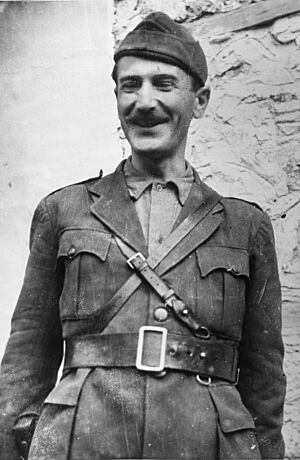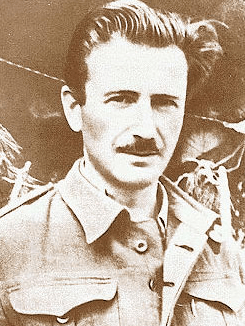Markos Vafeiadis facts for kids
Quick facts for kids
Markos Vafeiadis
|
|
|---|---|
| Μάρκος Βαφειάδης | |

Markos Vafeiadis in 1948
|
|
| Member of the Hellenic Parliament for National list |
|
| In office 5 November 1989 – 22 February 1992 |
|
| Head of the Provisional Democratic Government | |
| In office December 24, 1947 – February 7, 1949 |
|
| Succeeded by | Nikos Zachariadis |
| Personal details | |
| Born | 28 January 1906 Tosya, Ottoman Empire |
| Died | 22 February 1992 (aged 86) Athens, Greece |
| Resting place | First Cemetery of Athens |
| Nationality | Greek |
| Political party | Communist Party of Greece Panhellenic Socialist Movement |
| Nickname | Kapetan Markos |
| Military service | |
| Allegiance | |
| Branch/service | |
| Years of service | 1941–1945 (ELAS) 1946–1949 (DSE) |
| Rank | General |
| Battles/wars | Greek Resistance, Greek Civil War |
Markos Vafeiadis (born January 28, 1906 – died February 22, 1992) was a very important leader in Greece. He was a key figure in the Communist Party of Greece (KKE). Markos helped lead the fight against the Nazi German occupation of Greece. He also played a big role in the Greek Civil War that followed. People often called him "Kapetan Markos."
Early Life and Activism
Markos Vafeiadis was born in a place called Tosya, which was part of the Ottoman Empire (now Turkey) in 1906. When he was 17, he became a refugee in Greece. This happened because many people moved between Greece and Turkey in 1923.
In 1928, he started working with the Young Communist League of Greece (OKNE) in Thessaloniki. Because of his political actions, he was put in prison in 1932. This was a type of punishment called "internal exile," where people were sent away from their homes.
After he was released in 1933, he continued his work for the party. When Ioannis Metaxas became a dictator in Greece, Markos was exiled again. He was sent to an island called Ai Stratis. But he managed to escape quickly. He then helped lead an uprising in Crete in 1938 against the dictator. After this, he was arrested again and sent to Gavdos island.
Fighting for Freedom: World War II and Civil War
In May 1941, Nazi Germany took over Greece. Markos Vafeiadis and other prisoners escaped from Gavdos island. They started working secretly against the German occupation. He worked in places like Crete, Athens, and Thessaloniki.
In 1942, he joined the main leadership group of the Communist Party of Greece. He became a supervisor for the Greek People's Liberation Army (ELAS) in Macedonia. In October 1944, after the German army left, Markos and his ELAS fighters entered Thessaloniki as liberators.
His forces helped free Central Macedonia. They also saved many Greek Jews from danger as the Nazis were leaving. In 1946, Markos Vafeiadis disagreed with Nikos Zachariadis, another leader of the KKE. Zachariadis wanted to create a large, standing army. Markos believed it was better to fight using small, quick attacks, known as guerrilla warfare.
Even with their disagreement, Zachariadis made Markos the leader of the communist guerrilla groups in July 1946. In October 1946, Markos became the head of the Democratic Army of Greece (DSE). By December 1947, he was named Prime Minister and War Minister of the Provisional Democratic Government.
Later in the Greek Civil War, Markos and Zachariadis had more disagreements about how to fight. Because of this, Markos was removed from his leadership role in August 1948. He was removed from all his positions in January 1949. In 1950, he was even kicked out of the Communist Party. He had to leave Greece and went to live in the Soviet Union.
Life After the War
After the time of Joseph Stalin ended, Markos Vafeiadis was allowed back into the KKE. He was even elected to a high position in the party. However, he again had disagreements with the party leaders. This led to him being removed from his job in 1958. He was then kicked out of the KKE for a second time in 1964.
In March 1983, after 33 years of living in the Soviet Union, Markos returned to Greece. He settled on the island of Chios. There, he wrote his Memoirs, which are like his life story. He became a supporter of Andreas Papandreou, another Greek politician. In 1989 and 1990, he was honorarily elected to the Greek parliament. This was through the Panhellenic Socialist Movement (PASOK) party. In 1984, he was given the high rank of General in the Hellenic army.


